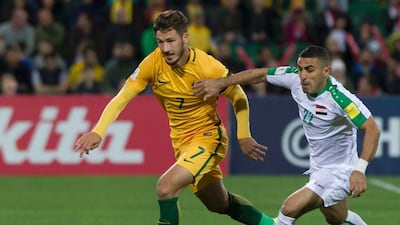On Tuesday, Australia’s national football team, the Socceroos, will play the UAE in a World Cup qualifying match in Abu Dhabi. It is an important event for me, as it will be the first international contest by an Australian team in the UAE since I became Australia’s ambassador in January. It’s also an important event for the UAE, not just because every game is a test for the national side, but also as preparation for hosting the 2019 Asian Football Cup, which Australia hosted last year. We will work with the UAE to help make AFC 2019 the great success it was for us.
Tuesday’s World Cup qualifier, and its timing immediately following the Olympics, gives us an opportunity to reflect on the value of sport beyond the pitch and the benefits it brings to our mental, physical and social well-being, as well as in building resilient communities and fostering international peace and friendship.
Australians love sport. We love sharing a good sporting contest with friends like the UAE. However, the benefits of sport reach far beyond the sporting arena. Sport can and does bring value to the lives of individuals, communities and nations, and can help cement international ties and global linkages, not least through our athletes. We are very proud of Australia’s Mark Milligan, who makes a super sporting contribution in the UAE playing for Baniyas SC.
Sport helps to build leadership and teamwork as well as developing respect, resilience and determination, particularly in children. Sport also brings economic benefits and international recognition. The UAE, as a sporting hub, is well known for hosting top shelf international events from the Dubai Sevens to the Sailing World Cup and Formula One. In fact, Australian F1 champion, the late Jack Brabham, participated in the first UAE motorsport event, the 1981 Dubai Grand Prix, and our latest F1 competitor, Daniel Riccardo, will participate again this year in the signature event in Abu Dhabi.
Sharjah is the cricket hub of the Gulf, and of course the UAE is one of the best established centres for jiu-jitsu in the world, under the leadership of Sheikh Mohammed bin Zayed, Crown Prince of Abu Dhabi and Deputy Supreme Commander of the Armed Forces.
Beyond these sports, there are few spectacles that capture the imagination the way the Olympics do. They are perhaps the best example of sport as a unifying power. The Rio Olympics saw the participation of a refugee team for the first time. This involved the notable inclusion of Syrian swimmer Yusra Mardini, whose heroism and captivating story of swimming while pushing a boat of fellow refugees across the Mediterranean, outshone even her final competition rankings.
Sports diplomacy not only builds friendships but also national pride. Think of the enduring image of Nelson Mandela – his country’s first president of the post-apartheid era – crowning as world champions a South African rugby side comprising of many different ethnic backgrounds. This is because sport is not just about winning or losing. It is about a shared experience, a shared contest, and it represents values that bring out the best in us as people – ultimately we are in competition with ourselves first and foremost.
Sport offers a way to share experiences and cross cultures but is also lets cultures define themselves. In Australia, most of the population lives on or near the coast. We swim well. As a result, we pride ourselves on the performance of our swim team in international competition. We are also quick to take on new sports like rugby sevens – a new Olympic discipline. I warmly congratulate the magnificent Australian women’s rugby sevens Olympic gold medallists, as well as our wonderful Pacific Island brothers, the flying Fijians, who won the men’s gold. And we Australians also cherish our own distinctive qualities, which is why the most popular game in Australia is our own unique game – Australian Rules Football – a mix of speed, finesse and power.
Equally the UAE is characterised by the sports that it values and has developed over the years. We see in those sports a wonderful reflection of the culture of the UAE. Falconry, horse racing and endurance riding, camel racing and dhow racing all remind us of the history and values of a civilisation with deep and ancient roots in the Arabian Peninsula.
Which brings me back to Tuesday’s World Cup qualifier. What a great and tough contest it is likely to be, given its importance to both teams and the proud performance by the UAE team in Japan (mabrouk!), as well as the strong win by the Socceroos against Iraq. I will certainly be wearing a green and gold scarf on the night, but will also be delighting in the joy of the game, the friendships we will build and the experiences we will share. See you at the Mohammed bin Zayed Stadium on Tuesday at 7.30pm. Wear your team colours – and may the best team win.
Arthur Spyrou is the Australian ambassador to the United Arab Emirates

